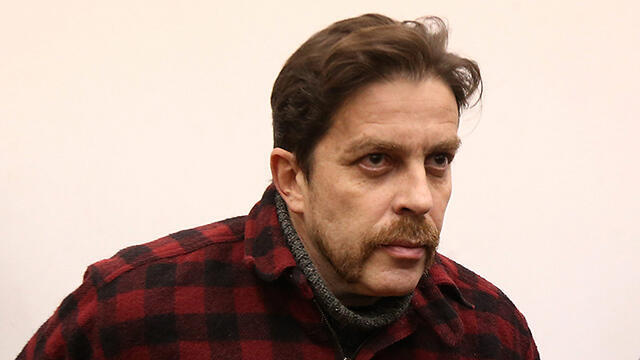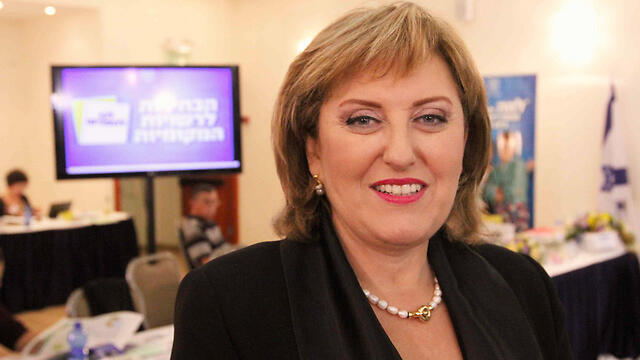Getting your Trinity Audio player ready...
Former deputy foreign minister Faina Kirschenbaum (Yisrael Beytenu) was indicted on Tuesday for her part in a wide scale corruption affair involving other senior public figures.
She was charged with multiple counts of receiving and asking for bribes, fraud and breach of trust, money laundering as well as tax offenses.
Alongside the indictment, the State Attorney's Office has asked that NIS 5.7 million worth of Kirschenbaum's property be seized.
In addition to Kirschenbaum, the State Attorney's Office filed initial indictments against nine other suspects in more than 10 different cases.
According to the indictment, from 2006 and until the launch of the police's open investigation against her in December 2014, Kirschenbaum has acted in a planned and systematic manner—at times even sophisticated—to commit a series of offenses.
She is suspected of receiving bribes in return for allocating funds that originated in the state's coffers to different municipalities and organizations.
Kirschenbaum was in charge of the allocation of the party's coalition money—some NIS 170 million a year in taxpayer money given to parties as part of their coalition agreements to do with as they see fit.
She allegedly took advantage of her position and status as a public servant, and particularly her control of the party's coalition money, to demand and receive bribes from public institutions, organizations and private individuals. These bribes were given in the form of illicit benefits to her and her family, the Yisrael Beytenu party and close associates of hers or the party's.
Often, Kirschenbaum also asked, urged or demanded other public servants, heads of state institutions, heads of NGOs and private individuals to help her to carry out her criminal actions and then cover it up.
The other defendants in the main indictment, which includes Kirschenbaum, are:
- David (Daud) Godovsky, Yisrael Beytenu's chief of staff, was charged with receiving and asking for bribes, extortion and intimidation, conspiracy to commit a crime, money laundering and other tax offenses. According to the indictment, Godovsky was Kirschenbaum's main accomplice in planning and carrying out a significant part of her criminal offenses. He worked to promote his own personal affairs as well as those of Kirschenbaum and Yisrael Beytenu.
- Rami Cohen, the former director-general of the Agriculture Ministry and a business consultant, was charged with giving and receiving bribes, demanding bribes, money laundering, fraudulently obtaining benefits, intimidation, forgery of a document under aggravated circumstances, obstruction of justice and other charges.
- Batya Cohen, Rami Cohen's wife, was charged with obstruction of justice.
- Efi Peles, the treasurer of Binyamin Regional Council, was charged with bribery and money laundering.
2 View gallery


David (Daud) Godovsky, Kirschenbaum's main accomplice (Photo: Shaul Golan)
(צילום: שאול גולן)
The second indictment deals with the officials from the Ezra Movement and the Ayalim Association who bribed Kirschenbaum. The defendants in that indictment are:
- Daniel Elinson, the director of the Ezra World Movement, was charged with bribery and money laundering.
- Matan Dahan, the chairman of the Ayalim Association, was charged with bribery, money laundering and conspiring to commit a crime.
- Danny Glicksberg, the deputy director of the Ayalim Association, was charged with bribery, money laundering and conspiring to commit a crime.
- Steven Levy, a lobbyist working for the lobbying firm Impact, was charged with asking, giving and offering bribes, money laundering and conspiring to commit a crime.
- Irena Waldberg, the director of the Entrepreneurs Association, was charged with bribery.
In some of the cases, Kirschenbaum received the bribes she demanded straight away in the form of money or other benefits.
In other cases, she was asked to help secure state funding for different municipalities and organizations, including the Samaria Regional Council, the Megilot Regional Council, the Ezra Movement, the Ayalim Association and private individuals promoting public activity. She agreed to provide the needed funding, and in return Kirschenbaum and Godovsky demanded bribes in the form of a significant portion of the funds received.
In that way, a significant portion of the coalition funds made its way back to the pockets of Kirschenbaum, her close associates of the Yisrael Beytenu party.
The bribes took different forms, such as purchasing flight tickets, computer and photography equipment or other electronics for Kirschenbaum and her family; funding Kirschenbaum or Yisrael Beytenu's private objectives, which were falsely presented as the objectives of their bribers; providing free services to the Yisrael Beytenu party; and employing close associates of Kirschenbaum or the party.
Gershon Mesika, the former head of the Samaria Regional Council and chair of the Central Company for the Development of Samaria, became a state witness in the large-scale corruption affair in March 2015.
Officials at the State Attorney's Office described the corruption scandal as one of the most severe in Israel's history. They are hoping to use Mesika's testimony to convict Kirschenbaum, who was a high-profile member of Yisrael Beytenu and a close associate of Chairman Avigdor Lieberman. The bulk of the party's activities went through her, and she was involved in all its parliamentary and political moves.
Former tourism minister Stas Misezhnikov is also among the suspects in the case.


